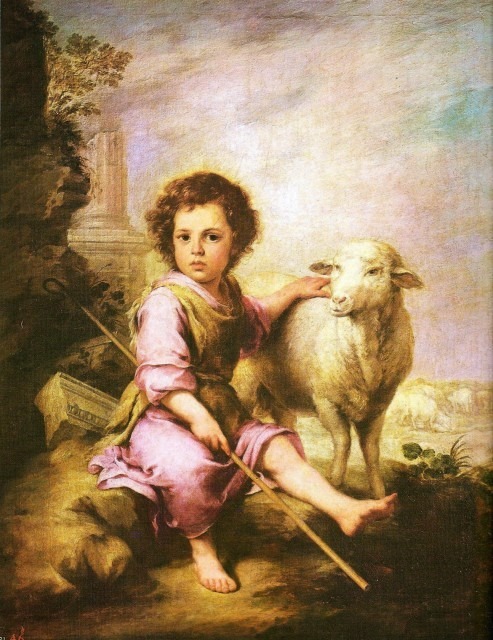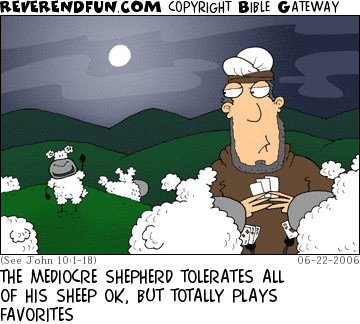Worship Helps for Easter 4
Christ the Good Shepherd
Bartolome Esteban Murillo
1660
Worship Theme: Jesus is our Good Shepherd. We are his
sheep. Our Good Shepherd loves us so much that he gave his life for us. He
knows us all by name. He protects us from our enemies. He gives us courage and
strength. He continually brings more sheep into his fold. He promises heaven to
all who believe in him. How great is the love that God has lavished upon us!
First Lesson: Acts 20:28–32
28“Always keep watch over yourselves
and over the whole flock in which the Holy Spirit has placed you as overseers,
to shepherd the church of God, which he purchased with his own blood. 29I
know that after my departure savage wolves, who will not spare the flock, will
come in among you. 30Even from your own group men will rise up,
twisting the truth in order to draw away disciples after them. 31Therefore
be always on the alert! Remember that for three years, night and day, I never
stopped warning each one of you with tears.
32“And now I entrust you to God and
to the word of his grace, which has power to build you up and to give you an
inheritance among all those who are sanctified.”
1. How did God acquire the church of God, according 20:28?
2. Who are the “savage wolves” whom Paul mentions (20:29)?
3. What is our true hope and strength against such
difficult enemies, according to 20:32?
Therefore, as a fellow elder and a witness
of the sufferings of Christ, and as one who also shares in the glory that is
about to be revealed, I appeal to the elders among you: 2Shepherd
God’s flock that is among you, serving as overseers, not grudgingly but willingly, as God desires, not because you are
greedy for money but because you are eager to do it. 3Do not lord it
over those entrusted to your care, but be examples for the flock. 4And
when the Chief Shepherd appears, you will receive an unfading crown of glory.
4. Instead of calling himself an apostle, or even “the
leading apostle,” what did Peter call himself?
5. Why does Peter say that Jesus, the Chief Shepherd, will
“appear,” not arrive or the like?
6. What will you receive when the Chief Shepherd appears?
11“I am the Good Shepherd. The Good
Shepherd lays down his life for the sheep. 12The hired man, who is
not a shepherd, does not own the sheep. He sees the wolf coming, leaves the
sheep, and runs away. Then the wolf attacks the sheep and scatters them. 13Because
he works for money, he does not care about the sheep.
14“I am the Good Shepherd. I know my
sheep and my sheep know me 15(just as the Father knows me and I know
the Father). And I lay down my life for the sheep. 16I also have
other sheep that are not of this sheep pen. I must bring them also, and they
will listen to my voice. Then there will be one flock and one shepherd. 17This
is why the Father loves me, because I lay down my life so that I may take it up
again. 18No one takes it from me, but I lay it down on my own. I
have the authority to lay it down, and I have the authority to take it up
again. This is the commission I received from my Father.”
7. What, above all, proves that Jesus is our Good
Shepherd? (See 10:11.)
8. What else does Jesus do for us?
Answers:
1. God acquired the church by buying her with his own
blood.
2. The “wolves” to whom Paul refers in 20:29 are false
teachers, men who distort God’s truth and who seek to gain followers for them.
They lure away former believers by those distortions.
3. Our hope and strength against such enemies is God’s
Word itself, the same Word that the false teachers distort. God’s Word builds
up believers in faith, and it gives us a place among those who are being set
apart to lead holy lives for God.
4. Peter called himself a “fellow elder,” and a “witness
to Christ’s sufferings.”
5. Peter says Jesus will “appear” because, though we
cannot see him, Jesus has not left us. He is right here with us in his Word and
sacraments. On the last day we will finally see him, when he makes himself
visible.
6. When the Chief Shepherd appears, we will receive the
crown of glory that will never fade away.
7. Jesus proved that he is our Good Shepherd by willingly
giving up his life for us his sheep.
8. Jesus also protects his sheep. He knows and loves each
of his sheep personally. His sheep know and love him. He regularly brings new
sheep into his flock, too.
Among the many names given to Jesus is “the good shepherd”
as described in this section of the gospel of John. His job as a shepherd, he
says, is to “lay down my life for the sheep.” Because he has complete knowledge
of all of us, and “my sheep know me,” there is an intimate relationship between
him and his sheep, all of us who believe in him. But Jesus goes on: “I have
other sheep that are not of this sheep pen. I must bring them also.” A good
shepherd uses all the resources at hand for the benefit of the sheep. Similarly,
our resources, given to us for our needs, should also be used in bringing in
the “other sheep.” We look to Jesus as our model for obedience and
unconditional love, and we, in turn, are to be models for others “not of this
sheep pen.”
In Dr. Luther's Large Catechism this is written: I am
brought into (this little holy group and congregation of pure saints) by the
Holy Spirit through having heard and continuing to hear God's Word. In the past
we were altogether of the devil, knowing nothing about God and about Christ.
So, until the Last Day, the Holy Spirit abides with the holy congregation or
Christendom. Through this congregation He brings us to Christ and He teaches
and preaches to us the Word. By the Word He works and promotes sanctification,
causing this congregation daily to grow and to become strong in the faith and
its fruit, which He produces.
The Catechism does not mention our cooperation. It credits
everything to the Holy Spirit who, through the preaching office, brings us into
the Christian Church, sanctifies us, and causes us to grow in faith and good
works.
Even in this life the regenerate advance to the point that
they want to do what is good and love it, and even do good and grow in it.
Still, this is not of our will and ability, but of the Holy Spirit. Paul says
that the Spirit works such willing and doing (Philippians
2:13). In Ephesians 2:10 he credits this work to God alone, "For
we are His workmanship, created in Christ Jesus for good works, which God
prepared beforehand, that we should walk in them." – Formula of Concord,
Solid Declaration, Article II, Free Will (paragraphs 36-39)
The King of love my shepherd is,
Whose goodness fails me never;
I nothing lack if I am his,
And he is mine forever.
Where streams of living water flow,
My Savior gently leads me,
And where the verdant pastures grow,
With food celestial feeds me.
Confused and foolish oft I strayed,
But yet in love he sought me
And on his shoulder gently laid
And home, rejoicing, brought me.
In death's dark vale I fear no ill
With you, dear Lord, beside me,
Your rod and staff my comfort still,
Your cross before to guide me.
You spread a table in my sight,
A banquet here bestowing;
Your oil of welcome, my delight;
My cup is overflowing!
And so through all the length of days
Your goodness fails me never.
Good Shepherd, may I sing your praise
Within your house forever!



Comments
Post a Comment